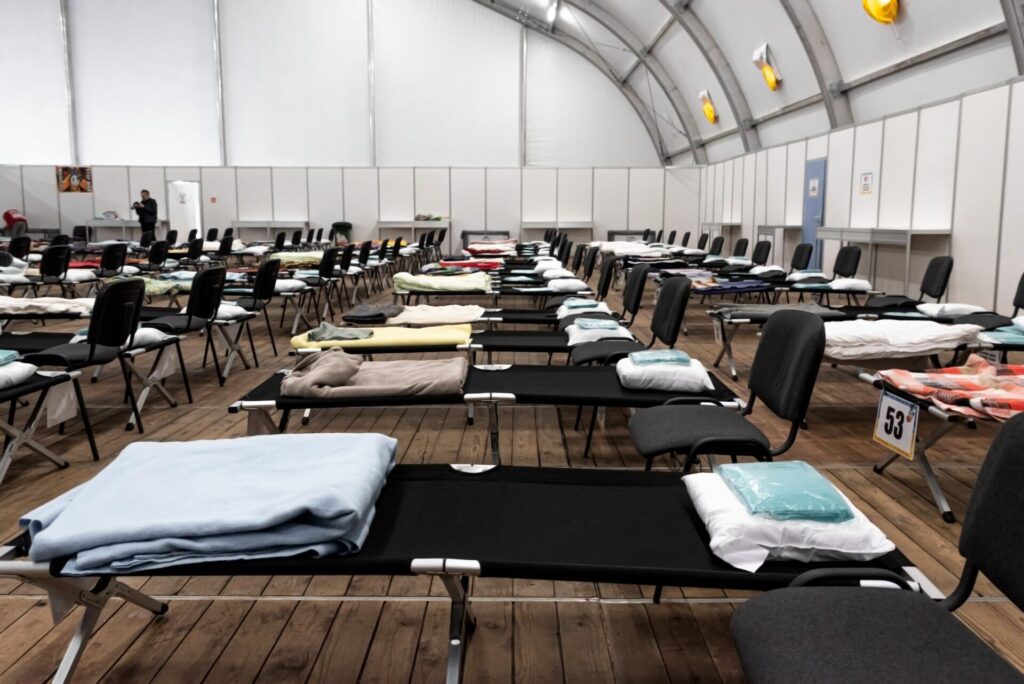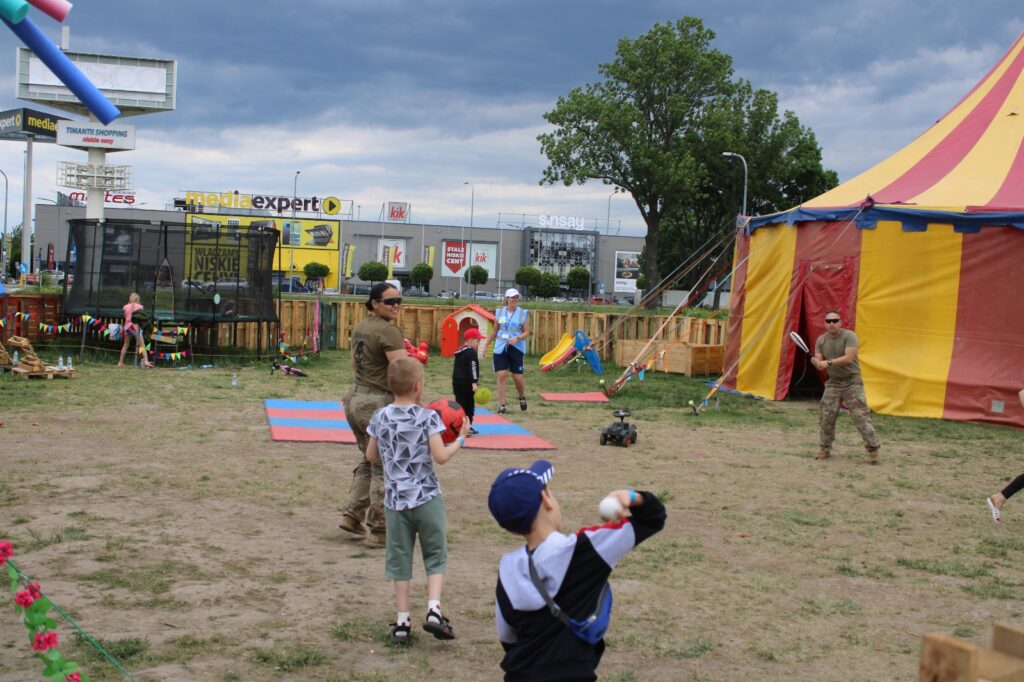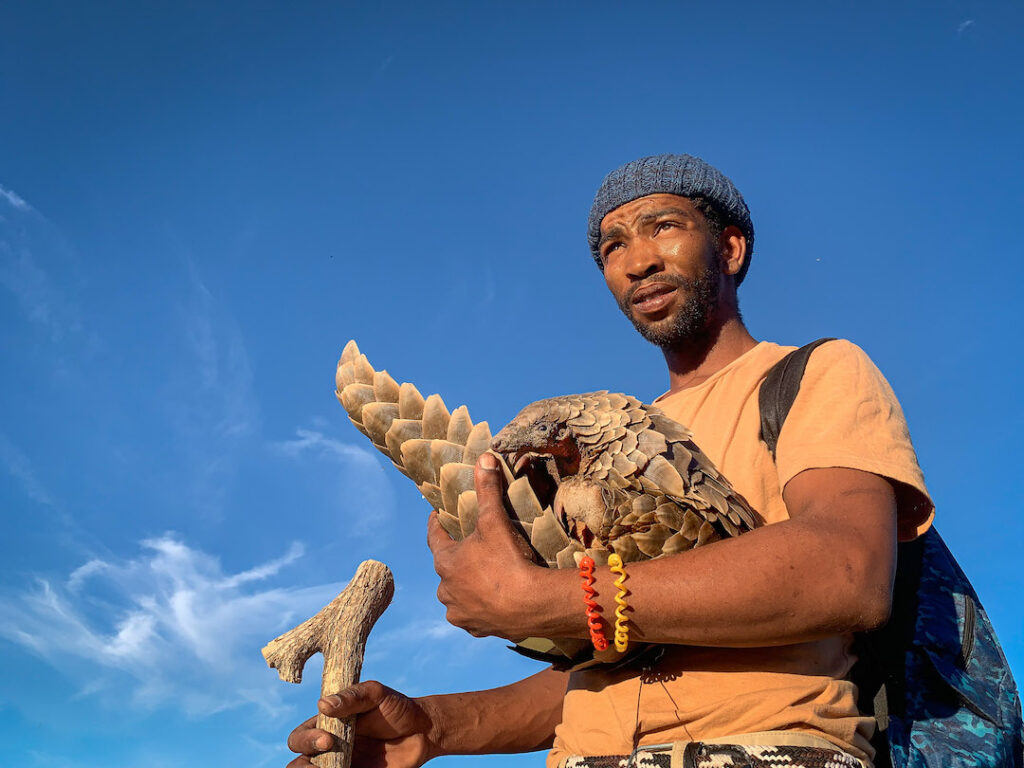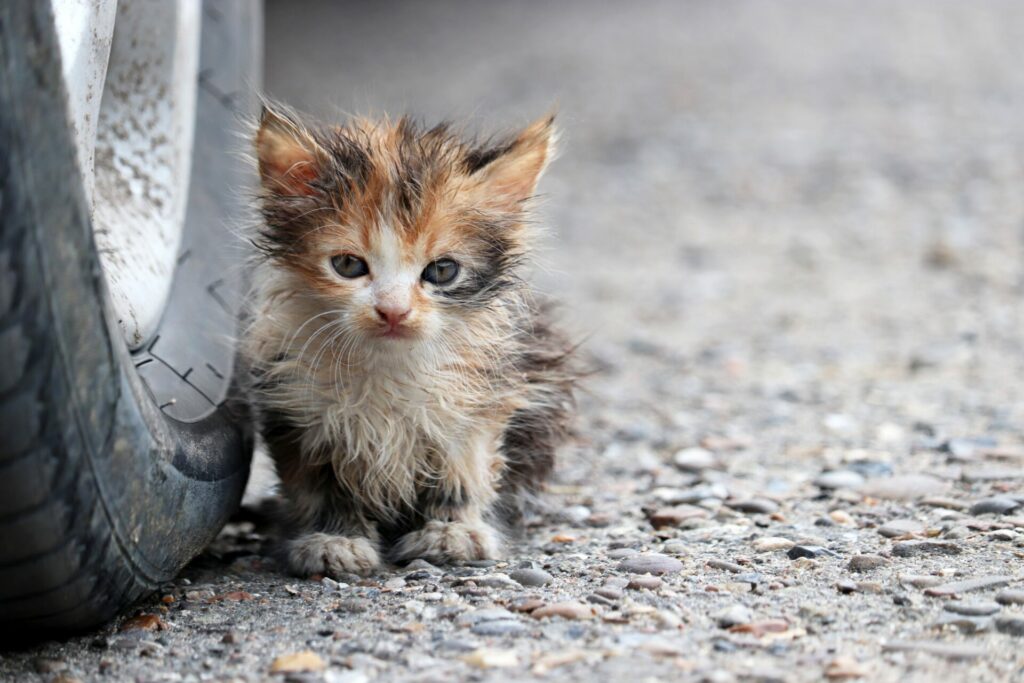Biting her lip in concentration, Tatiana* kept her eye on the ball arching towards her. She waited, trance-like, until it was just centimetres above her head before launching towards it, and, using her arms, sent it hurtling over the net.
A boy on the opposing team launched himself into the air, desperate to reach it, but he wasn’t fast enough. The ball smashed into the ground before rolling off the volley ball court.
‘Yes,’ Tatiana yelled, triumphant. ‘We won.’ She and her teammates gathered round, slapping her on the back until she couldn’t stop smiling. It was the first time Tatiana, nine, had laughed in a long time – ever since leaving her home town of Lviv to flee the war in Ukraine and reach Przemysl on the Polish border.
Now she and her mum, aunt, cousins and new-found friends were living in Przemysl in a former supermarket as they waited to be placed with host families anywhere in Europe from Warsaw, Germany, or France.
Safe Play Zones
But rather than leave the children to dwell on the conflict, and what they’d left behind, they were now being encouraged to play sports, dance, draw and even do yoga sessions, thanks to The Change Foundation, a UK-based charity.
‘Seeing young families walk across the border with one carrier bag of their belonging was hard. I felt so useless at that moment. I wanted to give these families my everything.’
Ellen Rowley, The Change Foundation
The Change Foundation uses sport to reach out to marginalised young people, and coaches, mentors and volunteers who have spent the last eight weeks setting up safe play zones for the young refugees.
‘Visiting the border and seeing young families walk through with one carrier bag of their belongings hit hard,’ said Ellen Rowley, Programme Manager, The Change Foundation. ‘I felt so useless at that moment. I wanted to give these families my everything.’
While the children play, parents and guardians can do paperwork and make arrangements to find new homes across Poland and further afield and secure short-term food and shelter in the refugee site. It also means they can try and contact family members left behind, knowing that their children are safe playing and happy.

The charity, which is celebrating its 40th anniversary, set off to help the families after they started coming over the border in February when Russia invaded Ukraine. Sports and play sessions were a priority to keep the children’s minds off what was happening back home.
CEO Andy Sellins, along with project workers Ellen Rowley, Dan Lineker, Navjeet Sira and Dean Lamb ran the sessions at the former supermarket called the Refugee Centre for Humanitarian Aid, but known locally as Tesco. It provides basic food, healthcare and accommodation, for around 1,000 children and women, but had little in the way of recreation.
Teaching Sports
The programme expanded to include 40 nearby hostels, each temporary housing small family groups – but offering no leisure activities of any kind.
‘When we arrived we found a volleyball net had been put up, but no-on seemed to know how to use it,’ Andy said. ‘So we organised volleyball, handball and football. The kids made up some of their own games, based around catching.’

The coaches got around the language differences by demonstrating activities and games which the children copied. A whistle provided the basic method of communication, breaking up the games and starting and finishing sessions which the children who left the yard, talking with each other and laughing.
‘We quickly realised we had to go and find the kids to take part,’ Andy explained. “No-one else was doing that, some volunteers wanted to organise sports but they were just standing around and not getting any interest.’
Donated Sports Equipment
This proactive approach quickly attracted attention and other local and international voluteers were taught how to provide activities so that the sessions could continue and expand as the team moved on across the town and surrounding villages. Other aid workers donated sports equipment, balls and bibs. A similar approach was adopted for local families who had taken in refugees, who up until the charity workers’ arrival had received very little in the way of assistance in any form.
Ellen, Programme Manager at the charity, explained that they adapted the sports sessions as more children and teens became involved. ‘We found that using music works really well as it can be upbeat, like zumba, or slow and controlled,’ she said. ‘The benefit of movement to music was we that incorporated all ages, all abilities and all styles in one small space.
‘We wanted the young people to have a healing moment to release their endorphins and be at one with the music. It was about creating a positive environment and giving young people a safe space and time to talk and play.’
The team said the sessions had a positive effect on the entire camp, which houses around 1,000 people, and is on the outskirts of the town.
‘The children mirrored our energy,’ Ellen explained. ‘When energy levels were high the kids absorbed this and it echoed throughout the camp.
‘And when it was a time of relaxation and finding peace, the young people performed yoga, or simply sat down along side us and began colouring.’
The charity were moved by the impact they had on the children – and their parents. ‘The adults were also getting involved and sharing their stories to our team,’ Ellen said. Having them write powerful messages on their phone to us such as “thank you” or “my kids adore you”, meant more than anything.’
‘These sessions allowing kids to be kids, to have fun, and allow them to focus – however briefly – on something other than the horrors of the war in Ukraine they have been forced to flee.’
The programme is part of an ongoing refugee iniative by The Change Foundation and further projects are planned for other centres housing Ukranian refugees in countries including Moldova and Hungary.
It is backed by the Australian Embassy in Ukraine who are donating footballs and sporting equipment.
Ambassador Bruse Edwards said: ‘These sessions provide parents with much-needed time to pause and organise next steps, while at the same time allowing kids to be kids, to have fun, and allow them to focus – however briefly – on something other than the horrors of the war in Ukraine they have been forced to flee.’
*Tatiana is real but we’ve chosen to disguise her identity to protect her













